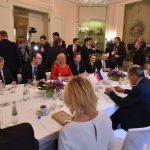ZAGREB, July 27, 2018 – Croatia and Russia have resolved several important issues since last October, including the role of Sberbank in rehabilitating the indebted Agrokor conglomerate and air pollution in Slavonski Brod, making progress in their relations as a solid foundation for their further development, Croatian President Kolinda Grabar-Kitarović said in interview with the HRT public television network on Thursday evening.
Grabar-Kitarović paid an official visit to Russia in October 2017, meeting with Russian President Vladimir Putin in the Black Sea resort of Sochi. They also met on the margins of the football World Cup, which ended earlier this month.
“From my official visit to Russia in October until our talks on the margins of the World Cup, we have concluded that during that time we resolved several problems, including the role of Sberbank in Agrokor’s rehabilitation and air pollution in Slavonski Brod. We have concluded that we have made good progress and that this is a solid foundation for moving on,” the president said.
As for Sberbank’s role in the Agrokor case, she said that the bank’s representatives had been saying from the start that they had good intentions. “They, of course, want to recover the money they have invested in Agrokor, but they also want it to be one of the most successful European companies, taking care of all suppliers and all other companies. This is very important to me when it comes to companies related to Slavonia,” she said.
She said that other areas of the economy could be stimulated through that process, such as beef production and exports, and that this could boost Croatian exports to Russia.
Grabar-Kitarović confirmed that the two sides were discussing Putin’s reciprocal visit to Croatia, which will depend on the schedules of both presidents, but stressed that the visit was not in question. “It will happen when we agree the agenda and timetable.”
Speaking of Russia as a global power, she said that Croatia supported the two-track approach by the European Union and NATO, which insist on respect for international law, including the national sovereignty, territorial integrity and political independence of any state, while at the same time taking account of the fact that burning global issues, such as the Syria crisis, which is also affecting Croatia through the migrant crisis, cannot be solved without Russia.
“Russia is also an important player in Southeast Europe, and what is important to me is to ensure that the Russian Federation fully supports the territorial integrity of Bosnia and Herzegovina and its European path,” the Croatian president said.
Grabar-Kitarović said that Croatia wants to do what’s best for its economy, which is partly affected by the existing sanctions against Russia, adding that Croatia should find those products that can be exported outside the sanctions regime.
She said that Agrokor, which will be largely managed by Russia’s Sberbank and VTB banks, should be “ensured an appropriate position on the Russian market.”
Asked about the visit earlier this week by Israeli President Reuven Rivlin, with whom she visited the site of the Jasenovac WWII concentration camp, and the fact that the Jewish community has boycotted state-sponsored commemorations at the Jasenovac memorial site for three years, Grabar-Kitarović said: “I regret that official commemorations are a stumbling block. I usually do not take part in them because Jasenovac for me is an emotional place… I like to pay my respects to the victims in silence. I hope the next commemoration will be in the spirit of unity in the country and that we all will organise that commemoration together. In that case I too will be ready to join such a commemoration for the sake of national unity so that we would properly pay respects to all victims of Jasenovac.”
She reiterated that she totally condemns any attempts to manipulate the number of the Jasenovac victims. “To pay respects to all the people who were killed there and show sympathy with their families and everyone else who has had to cope with that, I think it is worthy of every person.”
Asked about her ardent supporting of the Croatian national football team at the World Cup in Russia, after which she has received over 70 requests for an interview from around the world, Grabar-Kitarović said: “I didn’t expect it would meet with such response, but on the other hand, it would be hypocritical of me to say that I am not glad that this happened. People want politicians to show both their strengths and weaknesses, and above all they want to feel that we respect people.”
“More than 80 percent of responses were positive. There was some fake news too, both good and bad. We didn’t react because my office normally doesn’t issue denials. All in all, it was very positive,” the president said, dismissing claims that she had stolen the show from the national team.
The president said she had not begun campaigning for a second term in office, because if she had, should would have been more restrained in Russia. “I am not campaigning for a second term, I haven’t thought about it. I was with our team with my whole heart. Had I thought about campaigning and possible political consequences, I would possibly have been more restrained in Russia,” Grabar-Kitarović said.
She said that over the last three and a half years she has been doing what she has told people she will do, and that is that she will be one of them, their voice, and president of all Croatian citizens.








